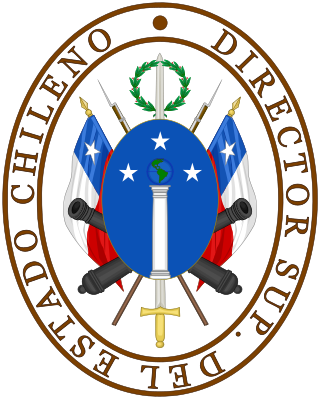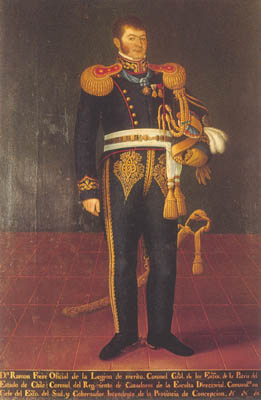This article needs additional citations for verification .(February 2016) |

Pelucones (Spanish for bigwigs) was the name used to refer to Chilean aristocratic conservatives in early 19th century.
This article needs additional citations for verification .(February 2016) |

Pelucones (Spanish for bigwigs) was the name used to refer to Chilean aristocratic conservatives in early 19th century.
The name "Pelucones" was originally used by the Pipiolos , or Liberals, as a derogatory term linking the conservatives to old fashioned wigs that were popular in the 18th century. Following the Chilean Civil War of 1829, when the Pipiolos were defeated, the Pelucones enforced the Chilean Constitution of 1833. This led to creation of a strong unitary, authoritarian and presidentialist system supported and maintained by the upper classes. [1]

The territory of Chile has been populated since at least 3000 BC. By the 16th century, Spanish conquistadors began to colonize the region of present-day Chile, and the territory was a colony between 1540 and 1818, when it gained independence from Spain. The country's economic development was successively marked by the export of first agricultural produce, then saltpeter and later copper. The wealth of raw materials led to an economic upturn, but also led to dependency, and even wars with neighboring states. Chile was governed during most of its first 150 years of independence by different forms of restricted government, where the electorate was carefully vetted and controlled by an elite.

Chile's government is a representative democratic republic, whereby the President of Chile is both head of state and head of government, and of a formal multi-party system. Executive power is exercised by the president and by their cabinet. Legislative power is vested in both the government and the two chambers of the National Congress. The judiciary is independent of the executive and the legislature of Chile.
The phrase "power behind the throne" refers to a person or group that is understood to de facto wield the power of a high-ranking official, or whose support must be maintained to continue in office.

Diego José Pedro Víctor Portales y Palazuelos was a Chilean statesman and entrepreneur. As a minister of president José Joaquín Prieto's government, he played a pivotal role in shaping the state and politics in the 19th century, delivering with the Constitution of 1833 the framework of the Chilean state for almost a century. Portales' influential political policies included unitarianism, presidentialism and conservatism which led to the consolidation of Chile as a constitutional, authoritarian republic with the franchise restricted to upper class men.

The Supreme Director of Chile was the Head of State and of Government of Chile in the periods of 1814 and 1817-1826.
The Liberal–Conservative Fusion was an oligarchic alliance between Chilean liberal (Pipiolos) and conservative (Pelucones) political parties that existed from 1858 to 1874.

The Chilean Civil War of 1829–1830 was a civil war in Chile fought between conservative Pelucones and liberal Pipiolos forces over the constitutional regime in force. This conflict ended with the defeat of the liberal forces and the approval of a new constitution in 1833, that was in force until 1925.

The Conservative Party of Chile was one of the principal Chilean political parties since its foundation in 1836 until 1948, when it broke apart. In 1953 it reformed as the United Conservative Party and in 1966 joined with the Liberal Party to form the National Party. The Conservative Party was a right-wing party, originally created to be the clericalist, pro-Catholic Church group.
The Liberal Party was a Chilean political party created by a faction of pipiolos in 1849. After the conservative victory in the Chilean Civil War of 1829 the liberals became the principal opposition party to the Conservative Party. During the Liberal Party's early history one of its main goal was to create a new constitution to replace the Chilean Constitution of 1833. Rigged election helped to prevent the Liberal Party's presidential candidates to be elected until 1861, during that time elements of the liberal party made attempts to overthrow the government, these were the Revolution of 1851 and the Revolution of 1859. These failed insurrections led many liberals to emigrate, among them Benjamín Vicuña Mackenna. In 1863 a group of liberal split off to form the Radical Party which would hold power from 1938 to 1952. Originally an anticlericalist party that championed classical liberalism, the liberals later became a right-wing party.
Pipiolo may refer to:

Pipiolos was a name used to refer to Chilean upper class liberals in the early 19th century. The name "pipiolo" was originally used by the conservative Pelucones in a derogatory manner by associating the liberals to inexperience. In the Chilean Civil War of 1829 the Pipiolos, led by Ramón Freire, were defeated and the Pelucones could triumphantly enforce the Chilean Constitution of 1833, which led to creation of a strong unitarian and authoritarian presidentialist system held up by upper-class democracy.
José Manuel Ortúzar Formas (1796–1848) was a Chilean lawyer and politician. He was born in Santiago in 1796. He died in the same city, in March 1848. He was the son of José Manuel Ortúzar e Ibanez de Ovalle and Maria del Carmen Formas Patiño. He married Dolores Ramírez y Fernández Garzón.

Liberal Republic is the period of Chilean history between 1861 and 1891. It is characterized by the rise of the liberal political faction the Pipiolos who opposed the Pelucones who had dominated the preceding period known as the Conservative Republic. They promulgated constitutional reforms that limited the power of the president and increased the power of the Congress.

In Chilean historiography, the Conservative Republic was a period of Chilean history that extended between 1826 and 1861, characterized by the hegemony of the conservative party, whose supporters were called pelucones. It began with the defeat of the pipiolos (Liberals) by the pelucones at the Battle of Lircay ending the Chilean Civil War of 1829–30 and concluded in 1861 with the election of the independent Jose Joaquin Perez as president, ending the hegemony of the conservative party.
The Battle of Lircay was the last battle of the Chilean Civil War of 1829–1830 and ended with the Pipiolos (Liberals) being decisively defeated. Pipiolo leader Ramon Freire was exiled to Peru and the Pipiolos defeated to end the war, beginning a 30-year dominance of the Government of Chile by the Conservatives.
Events in the year 1830 in Chile.

Pedro Nolasco Vergara Albano also known as Pedro Nolasco Martínez de Vergara Albano was a Chilean deputy, governor and farmer.

José Victorino Lastarria was a Chilean writer, legislative deputy, senator, diplomat, and finance minister.
The history of the Constitution of Chile dates from 1811. There were 10 constitutional texts and a draft for a federal organization in 1826. Its common elements are the unitary form of state and presidentialism as a form of government.